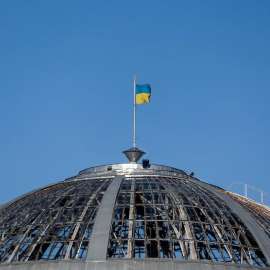
Over the past decade, Ukraine has built a vibrant and innovative fintech ecosystem, driven by skilled IT professionals, entrepreneurial talent, and a growing base of digital consumers.
From mobile banking apps and payment platforms to online lending and blockchain solutions, Ukrainian specialists have consistently pushed the boundaries of financial technology. Despite geopolitical challenges and economic volatility, the sector has demonstrated remarkable resilience and adaptability.
Recently, our publishing house conducted a comprehensive market analysis in collaboration with fintech expert and CBDO in Big Idea Fintech Group Yuta Romanchenko. The editorial team carried out a full-scale review of the global fintech landscape, combining regional insights, market data, and industry trends to provide a holistic perspective.
Підписуйтеcь на наш Telegram-канал Lenta.UA - ЄДИНІ незалежні новини про події в Україні та світі
This article explores how Ukrainian fintech professionals expand internationally, the opportunities and challenges they face in diverse markets, and the global trends shaping the industry in 2025.
Regulatory Landscape in Ukraine
Ukraine currently lacks a single comprehensive legal framework for fintech. Instead, the industry operates under a patchwork of laws regulating individual areas such as lending, insurance, and payments. Key legislation includes:
- The Law of Ukraine “On Licensing of Business Activities”
- The Law of Ukraine “On Financial Services and State Regulation of Financial Services Markets”
- The Law of Ukraine “On Insurance”
- The Law of Ukraine “On Credit Unions”
- The Law of Ukraine “On Financial Leasing”
- Various resolutions by the Cabinet of Ministers and the National Bank of Ukraine
- The Civil Code, the Tax Code, and other acts

As of 2024, more than 250 fintech companies operate in Ukraine, covering mobile banking, digital payments, online lending, and blockchain solutions. The number of market participants increased by 20% in just one year, confirming stable growth and rising demand for digital financial services.
Market capitalization grew by 18% in 2024, driven by international investment and partnerships with European firms. State initiatives supporting innovation, as well as legislative changes aimed at transparency and security, have also stimulated expansion.
Ukrainian fintechs increasingly adopt artificial intelligence to improve client service and risk analysis, while blockchain technology is used to secure data and enhance transaction transparency. New legislation is paving the way for digital currencies and tokens, further strengthening the crypto sector.
While the Ukrainian market continues to evolve, many specialists have already stepped onto the global stage. Their experiences abroad highlight both opportunities and challenges that differ sharply from the domestic environment.

Latin America: Payment Habits and Opportunities
One of the first lessons comes from Latin America, where Ukrainian professionals studied consumer behavior. Despite widespread digital adoption, bank transfers and digital wallets remain more popular than credit or debit cards in many countries. Mobile wallets are widely used for everyday payments, while Buy Now, Pay Later (BNPL) solutions are gaining traction in Peru and Mexico.
By contrast, Ukraine has historically been oriented toward card payments, with Visa and Mastercard dominating the market. This difference underscores a key insight: what works at home cannot simply be copied abroad. Products must be adapted to the payment habits and expectations of local consumers.
In Peru specifically, the government has introduced reforms such as Decree-Law No 1531 to promote fully digital banking and expand financial inclusion. Authorities are also working to unify fintech regulations and ensure interoperability across platforms, creating a more consistent and secure ecosystem. More detailed analysis of these initiatives can be found in the blog of Yuta Romanchenko.
If Latin America illustrates how culture shapes payments, the Indian market shows how regulation can both enable and constrain rapid growth.
India: A Complex but Promising Market
India represents one of the world’s largest and fastest-growing fintech hubs, with over 2,100 startups and a projected market size of $150 billion by 2025. However, the size and scale of the market are matched by its complexity. Strict regulatory frameworks, government-led initiatives such as the introduction of a digital rupee, and diverse local requirements make India both attractive and challenging.
In August 2025, India passed the Promotion and Regulation of Online Gaming Act, which banned all real-money gaming — from fantasy sports to poker — by equating skill-based games with gambling. This unprecedented law introduces severe penalties for operators and advertisers, radically reshaping one of the world’s largest digital markets and underscoring the importance of regulatory adaptation for businesses. Detailed analysis of this new legislation and its impact on the market can be found in the blog of Yuta Romanchenko.
For Ukrainian fintech professionals, accustomed to Ukraine’s fragmented regulatory landscape, adapting to India’s rules proved difficult. Despite this, they managed to transfer their expertise in mobile payments, digital banking, and client-focused service to one of the most competitive fintech ecosystems in the world.
The lesson from India is clear: entering new markets requires not only technological innovation but also deep regulatory and cultural adaptation.
But while India demands regulatory flexibility, Dubai demonstrates what happens when regulation and innovation work hand in hand.
Dubai: The New FinTech Powerhouse
If India represents complexity, Dubai symbolizes opportunity. In the first half of 2025, the United Arab Emirates (UAE) ranked second globally in the fintech market, surpassing the United Kingdom. Total fintech investments in the UAE reached $2.2 billion.
Unlike many countries, the UAE does not merely create favorable conditions for fintech — it actively invests in it. Government funds, accelerators, and special economic zones attract fintech, blockchain, AI, healthtech, and deeptech startups. Initiatives such as Hub71 in Abu Dhabi and the Dubai Future District provide startups with funding and grants without equity loss, access to corporate and government clients, as well as visa, tax, and legal support.
Dubai’s regulatory environment is unusually collaborative: instead of battling regulators, fintech firms grow together with them. The Emirates also legalized cryptocurrency, allowing salaries to be paid in crypto and enabling QR-code payments not only in restaurants but also across public spaces such as cafés, coworking hubs, gyms, and even transport systems. Authorities are considering legal frameworks for high-risk operations, further broadening the fintech landscape.
Another striking feature of the UAE is its digital-first approach: most government services are available online, company licenses can be obtained in a matter of hours, and banking or residency procedures require minimal paperwork. Combined with tax incentives and the widespread use of salary cards linked to digital wallets, this creates one of the most fintech-friendly environments in the world.
On top of this, the Emirates are actively positioning themselves as a “crypto oasis” for Europe and Asia — a jurisdiction where blockchain businesses, exchanges, and token projects are not only allowed but welcomed under transparent, innovation-friendly rules.
This simplified regulatory approach, paired with bold innovation, has attracted many Ukrainian entrepreneurs and specialists to Dubai, where they build businesses and integrate into the local fintech ecosystem.
Beyond regulatory models and investment flows, one factor unites all these markets: people. Ukrainian professionals themselves are shaping fintech’s global trajectory.
Human Capital: Ukraine’s Global Contribution
Technology alone does not ensure success; skilled and adaptable teams are essential. Many Ukrainian specialists have found employment in international companies, while others have opened local branches abroad under local licenses.
For this analysis, we collaborated closely with Yuta Romanchenko, a fintech expert with extensive experience in international markets. Since 2022, she has served as CBDO at Big Idea Fintech Group in Dubai, coordinating the development of local solutions for B2C partners across regions from Peru to Indonesia. Her expertise spans digital banking, platform launches, mobile applications, e-commerce projects, team leadership, and market positioning.
Big Idea Fintech Group focuses on the international market and specializes in financial processing, digital payment solutions, and the development of fintech ecosystems powered by AI and automation. The company creates tailored solutions for B2B and enterprise partners, helping to scale financial services globally while maintaining a strong foothold in such regions as Latin America, Eastern Europe, and Central Asia.
“We see fintech not only as a technology but as an ecosystem,” explains Yuta Romanchenko. “At Big Idea Fintech Group, we work with financial processing solutions built on bots and artificial intelligence to optimize conversion, cascading, and performance. But I believe that automation should never replace the human factor. Thanks to Ukrainian specialists, client service and 24/7 support remain a core value — from the C-level to contact centers. This culture of personal communication, deeply rooted in Ukrainian business, is something we bring into every international market.”
As a result, fintech services from Canada to India are gaining not only advanced IT expertise but also a “human face.” Ukrainian professionals embed their values of resilience, adaptability, and client-centricity into the DNA of global fintech.
This combination of skilled teams, innovative technology, and cross-border experience directly informs the conclusions we draw about the global fintech landscape. From payment habits in Latin America to regulatory adaptation in India, and from the collaborative innovation model in Dubai to the integration of AI and blockchain, it is the people — their expertise, vision, and cultural approach — that ultimately shape how financial services evolve worldwide.
Ukraine’s fintech sector is expanding beyond its borders, proving resilient and adaptive despite limited regulatory structures at home. Latin America teaches the importance of cultural payment habits, India highlights the challenges of regulatory adaptation, and Dubai offers a model of collaborative growth and bold innovation.
The story of experts like Yuta Romanchenko illustrates the human dimension of fintech — resilience, adaptability, and vision. The next generation of financial services will be defined not only by artificial intelligence, blockchain, and digital currencies but also by strong teams, personalized service, and global collaboration.
About expert: Yuta Romanchenko is an international fintech strategist and CBDO at Big Idea Fintech Group in Dubai. She coordinates global projects from Peru to Indonesia, helping partners integrate advanced payment ecosystems, mobile banking, and AI-powered solutions. With previous leadership roles in Ukrainian banking and experience in luxury services at Quintessentially Group, Yuta combines deep knowledge of financial technology with a strong focus on client relations and market positioning. Her work has been featured in Forbes Ukraine.

Yuta Romanchenko, CBDO at Big Idea Fintech Group
Читайте также: Work on security guarantees for Ukraine is complete, says Macron
Читайте также: Trump says something will happen
Евгений МедведевНовости
В канадской школе произошла стрельба: 10 убитых
11:15 11 фев 2026.
Украина создала лазерную систему ПВО
10:50 11 фев 2026.
Рашисты убили трех маленьких детей на Харьковщине
10:10 11 фев 2026.
Трамп требует от Зеленского провести выборы и референдум
09:50 11 фев 2026.
Обстрел Украины: противник атаковал 129 ударными дронами
09:15 11 фев 2026.
Украинцев предупредили об опасностях из-за потепления
07:35 11 фев 2026.
В Дубае появится первая в мире улица из золота
05:35 11 фев 2026.
Столичные чиновники забыли выплатить детям-сиротам почти 200 тысяч
04:57 11 фев 2026.
В западной области Украины заметили «световые столбы» (фото)
00:05 11 фев 2026.































































